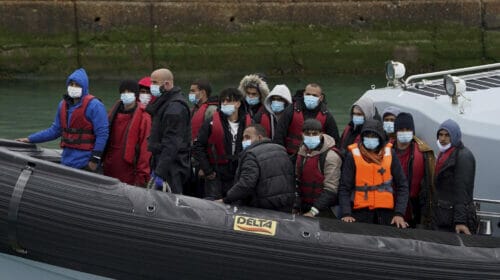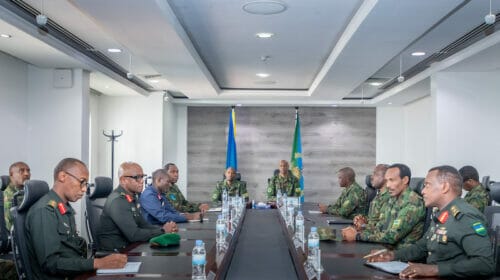Hate them for Me: The politics of Rwanda
The sun beat down on the protestors who never complained of any discomfort and who were told to use the bathroom of local gas station over a mile away since they were not allowed on school property. There was heavy police presence surrounding the peaceful protest and at one point this writer overheard a police officer telling a protester, “we are here for you and if anyone approaches to give you trouble please alert us.”
Yet, anyone who attends an international event for President Paul Kagame where protestors are present also know that there is an opposing side of supporters for Mr. Kagame who are just as passionate and just as vocal. Although, my encounter with them was a bit more aggressive than I expected. I will return this interaction in a moment.
In Rwanda there is a phrase in politics “politiki ya munyangire” which roughly translates to “Hate them for me” or “the politics of hate.” This seemed an odd phrase for a country that sells itself on peace and reconciliation so; I asked many of my Rwandan friends to translate this phrase for me and what it means to them. One stated, “its Kagame’s policy where if he hates someone he wants all people to hate that person if not you will also be called an enemy of course you can imagine how it has affected many people who have lost lives because they were friends to Kagame’s enemies.” Another friend replied, “It applies to the Head of state and his subordinates and anyone who supports the Rwandan Patriotic Front (RPF). You hate who I tell you to hate. Everyone is scared; they don’t take calls from anyone who is anti-government. This policy also affects the justice system. The whole of the country is affected. Ingabire is in prison because of this policy.” A friend in Rwanda explained how far back this policy goes by saying, “The major players are these who are in power or in control who want to secure them from a divergent voice. It has affected Rwanda since 1959 up to date. These periodical political crises (wars or genocide) resulted from this alternative kind of politics. In a word, discrete discrimination based on hatred.” A close friend explained it this way: “In Rwanda, when one person hates you, he or she goes makes an effort to convince (or spread the word) about how bad or evil you are. And in the end, the whole village or country may look at you as an enemy when in actual fact you are not.
President Kagame is very good in coercing people to gang against the person he does not like. He’s the architect of politics of hatred; and he has managed to use this type of politics to bring down many former RPF leaders by accusing them of corruption and making sure that everyone else believes him and joins his band wagon (forcefully).
Unfortunately, some people or institutions have taken up this bad attitude to crucify others. In a country where institutions are not independent but only dependent on the government, you have the heads of these institutions who victimize others (either because they have been asked by the president to do it) or simply because they have succumbed to the virus. An example is his Minister of Local Government (James Musoni) and former NSS Director General Col Emmanuel Ndahiro. Kagame uses these two guys to achieve his politiki ya munyangire.
The politiki ya munyangire has affected our basic and fundamental values. For example, trust, friendship, relationship, working together etc. In Rwanda today, people do not trust each other because you never know who has been sent to spy on you and compile a report which may cost you either your job or your life. It is hard to trust what a person is telling you, or even say what you think it is right because it may be used against you (Freedom of speech has been adversely undermined). I also think that politiki ya munyangire has promoted lots of political intrigues, he and his people are not ashamed to turn a lie into truth and influence people to believe it.”
Finally, one friend responded as if I was a part and parcel to this policy by responding as such, “If you want to do a complete research based on truth, I would advise you to go in Rwanda as well (If your research is based on Rwandan political issues) in that respect, you will earn more credit for your work (research).I am sorry but I view your questions as having intent to spy on me and I am not appreciating that. I also advice you not to write articles about the country you have never been to or visited. Whoever is using you is using you in a wrong way. Cheers and hope u understand!” Ironically, this individual announced his own oppositional political party just two weeks ago.
Now, back to the William Penn University protest. After the commencement ceremony was over and their final rituals were completed I returned to the protest area to interview a few more protesters that had arrived while I was in the graduation. I noticed what I thought to be a family of a student who were very well dressed and the police were escorting them away from the protestors. I approached them to ask about the ceremony, how they found the speech and where was their graduate. At first the woman in the orange dress stated she was from the Congo and did not speak English, a second woman dressed in silver began belligerently discussing the protestors calling them criminals, liars and distorting the image of a peaceful Rwanda. I continued to press about how they found the speech and where their graduate was, they then explained that they did not have anyone in the ceremony and had missed the speech but came to support their President. As the conversation heated up the woman in the orange dress began to speak perfect English! Their two male companions, one younger and one older, took over the conversation and even more aggressively made sure I was aware that the Rwandans in the US were criminals or they would be back in Rwanda. This group of Kagame supporters continued to try and gain access to the other protesters but the police continued to block them. So, they continued to yell their sentiments at me though directed at the other side of the protest. I listened to everything they said and as I was backing away the older gentleman was reaching for me to stay and continue to hear his speech. I remained so as not to incite further physical contact. After a time when they felt their side had been heard they began to leave. I returned to the Anti-Kagame protestors for a final goodbye and thank you for their interviews. As I approached my car I noticed the four Pro-Kagame supporters (total for the day’s attendance was seven) were at my car and blocking me from entering it. I tried to open my door when the youngest protestor blocked it and insisted I accept his invitation to visit Rwanda with him so I could see how peaceful it is. (It is a true dream of mine to one day visit the Land of a Thousand Hills but not under the current ruling regime.) I was finally able to get to my door and open it; as I was placing my belongings in my car the four continued to speak over each other making sure I understood their point of view and their praise of President Kagame when I noticed one of the men held my car door open and kept me from closing it. This interaction began to make me uncomfortable and since the event was over the police had left or I would have called for their assistance. They asked me my name and what publisher I worked for. I provided that information to them and asked them to look on Salem News for the article to follow. Upon finally agreeing, falsely as the offer was, to travel to Rwanda they allowed me to enter my vehicle and leave. I was taken aback by their forceful gestures and have only encountered this in social media. In person it is quite a different experience.
One final friend contributed his definition of “politiki ya munyangire,” “If it wasn’t this type of political play fewer Rwandans would be abroad, so it has impacted Rwanda in a large way, most-infamously manifested in the genocide. The Hutu-dominated regime was telling people how the RPF wanted to take them back to the days of serfdom, how their babies would be bashed by the royal family, etc. It’s the same thing right now where everyone who speaks against the regime is a genocidaire, (hater of Rwanda), and a threat to Rwandan unity. Dissidents are painted as wanting to return Rwanda to the days of division and genocide; you will see many of President Kagame’s supporters using this tactic a lot in social media.”
I recently finished reading a memoir where this exact political maneuver is described in an honest and painful way. The book “Rwanda: Where souls turn to dust” by Um’Khonde Habamenshi. He describes how he was forced out of his position in the Rwandan government and even though he never used this term his book certainly describes this political maneuver.


